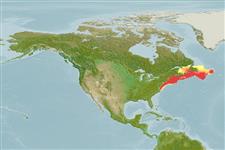Common names from other countries
أشلاق (القروش و الشفانين) (sharks and rays) >
Rajiformes (Skates and rays) >
Rajidae (Skates)
Etymology: Dipturus: Greek, di = two + Greek, pteryx = fin (Ref. 45335).
More on author: Mitchill.
Environment: milieu / climate zone / depth range / distribution range
البيئة
بحري القاع; محيطية (Ref. 51243); نطاق العمق 0 - 750 m (Ref. 55276), usually 0 - 150 m (Ref. 55276). Temperate; 0°C - 20°C; 51°N - 33°N, 84°W - 42°W (Ref. 55276)
Western Atlantic: Grand Bank and southern Gulf of St. Lawrence in Canada to North Carolina, USA. Threatened with extinction by intensive trawling (Ref. 27438).
الحجم / وزن / العمر
Maturity: Lm ? range ? - ? cm
Max length : 163 cm TL ذكر/ مختلط الجنس; (Ref. 114953); أعلا وزن تم نشرة: 18.0 kg (Ref. 7251)
وصف مختصر
الوصف الخارجي | قياسات المظهر الخارجي
Disk broad, with sharply angled corners and a pointed snout; front edges concave. No middorsal spines on disk. Tail with 3 rows of spine (1 middorsal row and 1 row on each side). Dorsal fins close together (Ref. 7251). Upper surface brownish, with many scattered small dark spots. Mucous pores on nuchal region. Lower surface white, blotched irregularly with gray (Ref. 6902).
Occur from water's edge to 430 m depth; absent from shoal waters in south during warm months (Ref. 7251). Found in salinities that range from 35 along the continental edge to 31.5 inshore along the open coast and as low as 21-24 (Ref. 6902). Live on all kinds of bottom (Ref. 205). Benthic (Ref. 5951). Feed on bivalve mollusks, squids, rock crabs, lobsters, shrimps, worms and fishes. Oviparous. Distinct pairing with embrace. Young may tend to follow large objects, such as their mother (Ref. 205). Eggs are oblong capsules with stiff pointed horns at the corners deposited during summer (with 6-month development) in sandy or muddy flats (Ref. 205, Ref. 114953). Egg capsules are 7.1-13.2 cm long and 4.6-7.4 cm wide (Ref. 41250). Males reaches maturity at ca. 100 cm TL, females at 96-105 cm TL; hatch size at 18-19 cm TL (Ref. 114953). Little use is made of the small quantities that are caught. In some cases, they are made into fish meal.
Life cycle and mating behavior
النضج | التكاثر | وضع البيض | بيض | الخصوبة | Larvae
Oviparous, paired eggs are laid. Embryos feed solely on yolk (Ref. 50449). Distinct pairing with embrace. Young may tend to follow large objects, such as their mother (Ref. 205).
McEachran, J.D. and K.A. Dunn, 1998. Phylogenetic analysis of skates, a morphologically conservative clade of elasmobranchs (Chondrichthyes: Rajidae). Copeia 1998(2):271-290. (Ref. 27314)
IUCN Red List Status (Ref. 130435)
CITES (Ref. 128078)
Not Evaluated
استخدامات بشرية
مصائد: غير ذات اهمية; لعبة سمكه: نعم
مزيد من المعلومات
مراجعالأستزراع المائيملف الأستزراع المائيسلالاتجينيElectrophoresesالتوريثالأمراضمعالجةMass conversion
أدوات
تقارير خاصة
Download XML
مصادر علي الأنترنت
Estimates based on models
Preferred temperature (Ref.
115969): 0.9 - 13.9, mean 7.3 (based on 497 cells).
Phylogenetic diversity index (Ref.
82804): PD
50 = 0.5000 [Uniqueness, from 0.5 = low to 2.0 = high].
Bayesian length-weight: a=0.00219 (0.00132 - 0.00363), b=3.22 (3.08 - 3.36), in cm Total Length, based on LWR estimates for this species & Genus-body shape (Ref.
93245).
مستوى غذائي (Ref.
69278): 3.5 ±0.0 se; based on diet studies.
المرونه (Ref.
120179): منخفض, الحد الزمني الأدني لتضاعف عدد أفراد المجتمع 4.5-14 سنة (Fec assumed to be <100).
Fishing Vulnerability (Ref.
59153): High to very high vulnerability (69 of 100).
Climate Vulnerability (Ref.
125649): High vulnerability (60 of 100).
